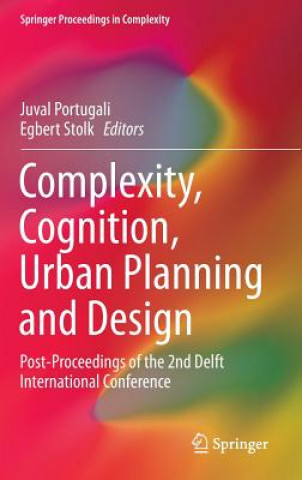
Doručenie
Nákupný poradca





Nehodí sa? Žiadny problém! U nás môžete do 30 dní vrátiť
 Darčekový poukaz
v ľubovoľnej hodnote
Darčekový poukaz
v ľubovoľnej hodnote
S darčekovým poukazom nešliapnete vedľa. Obdarovaný si za darčekový poukaz môže vybrať čokoľvek z našej ponuky.
Complexity, Cognition, Urban Planning and Design
 Angličtina
Angličtina
 685 b
685 b
30 dní na vrátenie tovaru
Mohlo by vás tiež zaujímať


The last four decades have witnessed the emergence of CTC - Complexity Theories of Cities - a domain of research that applies the various complexity theories to the study of cities.§Studies in this domain have demonstrated, firstly, that similarly to materialand organic complex systems cities too exhibit the properties of natural complex systems: they are open, complex, bottom-up, have fractal structure and are often chaotic. Secondly, that many of the mathematical formalisms and models developed to study material and organic complex systems apply also to cities.§But there is a dilemma in the current state of CTC: Cities are large scale artifacts, composed of smaller scale artifacts (buildings, roads, bridges ...), each of which is composed of still smaller artifacts and so on. And yet, artifacts are essentially simple systems.§This book argues that the activities and interactions of the human urban agents transform the artifact 'city' into a complex system 'city'. Cities differ from natural complex systems in that they are hybrid, artificial-natural complex systems. From here follows a need to add the insight of cognitive science to the study of urban agents and their behavior and action in cities, raising a new set of questions, such as what are artifacts and in what ways they differ from natural entities? How are they constructed? How the city as a hybrid natural-artificial entity is coordinated? What is the role of planning and design in the dynamics and coordination of cities? Who are the planners and designers and how do they plan and design and by what means? What is the role of cognitive faculties such as memory, emotions and creativity in the process of design? What role do latent and professional designers and planners play?§The answers to these questions cannot come from a single discipline; rather they must emerge out of a discourse between experts from several disciplines. The fact is, however, that due to current disciplinary boundaries, people from these domains do not often interact with each other. This is exactly the challenge this book took upon itself: to generate such a discourse.
Informácie o knihe
 Angličtina
Angličtina
Kategórie




 Ako nakupovať
Ako nakupovať






















